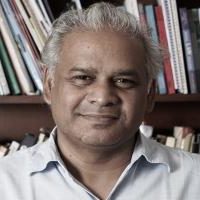Team

Srinivas Chokkakula
FELLOW
Srinivas Chokkakula is the MoJS (Ministry of Jal Shakti) Research Chair - Water Conflicts and Governance at CPR, where he leads the Transboundary Rivers, Ecologies, and Development studies (TREADs) programme. His research and policy interests lie primarily in the water sector, focusing on transboundary water conflict/cooperation and governance. He has written and published widely on the topic, both in academic journals and mainstream outlets. His interests extend to the broader area of politics of infrastructure development, including inland waterways, smart cities, and rural roads. As the MoJS Research Chair, he engages closely with relevant government agencies and is often consulted on various water policy and institutional issues. Srinivas is currently a Member of the Drafting Committee of India’s National Water Policy
Before his PhD and the shift to academics, Srinivas worked as a professional, engaging with wide ranging topics including urban and regional planning, and local governance in India; disaster response and reconstruction; and, indigenous knowledge systems for natural resource management. He has received several scholarships and fellowships, including the British Council’s Chevening scholarship in the Young Indian Environmental Managers programme
Prakriti Prajapati
RESEARCH ASSOCIATE
Prakriti Prajapati is a research associate at CPR’s Transboundary Rivers, Ecologies, and Development studies programme, and supports the research and outreach activities of the MoWR (Ministry of Jal Shakti, Government of India) Research Chair - Water Conflicts and Governance. She is researching the political, economic and institutional aspects of water management with particular reference to federal river water governance issues in India. Her wider research interests include political epistemologies of water in Asia, moral limits of policy decisions and everyday practices of Indian water bureaucracies.
Prakriti teaches professional ethics and social responsibility to senior undergraduates as guest faculty at the Indian Institute of Technology (IIT) Delhi, and has co-authored a book chapter in the first edition of the Routledge Handbook of Development Ethics.
Rakshita Goyal
RESEARCH ASSISTANT
Rakshita Goyal is a Research Assistant with CPR’s Transboundary Rivers, Ecologies, and Development Studies programme and the MoJS (Ministry of Jal Shakti) Research Chair- Water Conflicts and Governance. In this role, she researches various aspects of federal and inter-state governance of water in India. She is broadly interested in the interface of law and policy, particularly issues relating to constitutional law, human rights, gender, justice, and trade.
She holds a BA, LLB (Hons) degree from National Law University, Jodhpur.
Arun Gopinath
RESEARCH ASSISTANT
Lorem Ipsum is simply dummy text of the printing and typesetting industry. Lorem Ipsum has been the industry's standard dummy text ever since the 1500s, when an unknown printer took a galley of type and scrambled it to make a type specimen book. It has survived not only five centuries, but also the leap into electronic typesetting, remaining essentially unchanged. It was popularised in the 1960s with the release of Letraset sheets containing Lorem Ipsum passages, and more recently with desktop publishing software like Aldus PageMaker including versions of Lorem Ipsum.
Debarshee Dasgupta
RESEARCH ASSOCIATE
Debarshee Dasgupta is a research associate at CPR’s Transboundary Rivers, Ecologies, and Development studies programme, and supports the research and outreach activities of the MoWR (Ministry of Jal Shakti, Government of India) Research Chair - Water Conflicts and Governance. In this role, he researches various dimensions of federal and inter-state governance of water in India. He is broadly interested in environmental and institutional aspects of water governance and policy.
Debarshee also volunteers for Water Youth Network based in the Netherlands where he is working on projects related to knowledge platforms for innovations in water management and youth engagement in transboundary water cooperation.